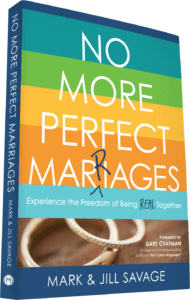 As we release this #MarriageMonday, it’s Halloween. Pumpkins are being carved and many kids and even families are excited to wear their themed costumes to go trick-or-treating. (If you’re into those sorts of things, of course.)
As we release this #MarriageMonday, it’s Halloween. Pumpkins are being carved and many kids and even families are excited to wear their themed costumes to go trick-or-treating. (If you’re into those sorts of things, of course.)
As spider webs embellish the houses on our streets for Halloween, we’ve been noticing something that, for us, is even more hair-raising:
The masks we wear in our marriages.
Within marriage, this is one of the scariest realities of all because it limits the connection we can have with our spouse as we hide behind our own dysfunction.
Some of our masks we inherited from our family of origin. Some of them stem from our personality and temperament tendencies. Others come from our identity issues. Regardless of where they come from, shame, fear, and insecurity fuel our tendency to wear masks. We tend to hide the parts of ourselves that we consider inadequate or unattractive.
Are some of these masks marring your marriage?
The Comedian Mask
This mask jokes about nearly everything. Inside marriage, this mask keeps us from taking the things our spouse says seriously. We minimize their concerns and tell them to lighten up. Outside of marriage, this keeps us laughing instead of digging deep at the pain our laughter sometimes covers up.
The Caregiver Mask
This mask finds its value by accomplishing tasks and being a helper. Inside marriage, this mask is worn by a worker bee who “earns” his or her place in the relationship by doing. Outside of marriage, this mask fuels activity and busyness, often in place of vulnerability and relational depth (if I stay busy, I don’t have to go deep in my relationships).
The Know-It-All Mask
This mask falsely keeps us “in control.” Inside marriage, it doesn’t allow for differences. Instead of valuing our spouse’s differing point of view, we believe our way is the only right way. The know-it-all mask prevents us from being open to change. It allows us to stay stuck and puts the pressure on our spouse to always be the one to change. Outside of marriage, this facade keeps others at arm’s length, resisting accountability and deep relationships that can mature us.
The Pleaser Mask
This mask is worn to keep the peace. Pleasers often lie for the sake of keeping peace in the marriage, but underneath their pleasant demeanor, they often feel resentment. Spouses of pleasers are often shocked when they discover this bitterness. Inside marriage, it is worn to reduce conflict and diminish criticism. Outside of marriage, the pleaser mask works to keep everyone happy.
The Passive-Victim Mask
This mask keeps us from speaking up and advocating for ourselves. Inside marriage, it results in an “it doesn’t matter” mindset. It also places the burden of responsibility on everyone else except the one wearing the mask. Outside of marriage, the person wearing the “passive victim” mask blames others for circumstances and doesn’t take responsibility for their own happiness or holiness.
The Overachiever Mask
This mask says, “If I work harder, you’ll approve of me more.” Inside marriage, it keeps us doing, doing, and doing some more, sometimes to the detriment of communication and emotional intimacy in the relationship. It also often harbors a critical spirit. Outside of marriage, it leads to workaholism, overcommitment, and a judgmental spirit.
**********
In our marriage, I (Mark) have worn the pleaser mask, the passive-victim mask, and sometimes the comedian mask. I think I wore the pleaser mask knowing that God has wired me to be a servant, but not understanding how to serve and not lose myself. As I unpacked my family of origin, I now see how I wore the same passive-victim mask as my birth father. Which is ironic, because, due to my parents’ divorce when I was two, I did not spend much time with him as I was growing up. The comedian mask always covered up hurt on the inside. It wasn’t until I was able to identify the masks and intentionally removed them that Jill and I began to experience a new relational depth.
I (Jill) wore the caregiver mask and the overachiever mask most often. If I am tired or overwhelmed, I can easily default to them even today. Both of these masks keep me from emotionally engaging in my marriage. They are naturally fueled by my Type A–driven, high-capacity temperament and personality type. It wasn’t until I was able to identify them and intentionally remove them that Mark and I began to experience the emotional intimacy we both longed for.
Masks provide us a false sense of security. They keep us from truly knowing one another. So it’s time for us to get naked. Emotionally naked, that is. (Well, physically naked is a good thing in marriage, too!) Strip down the expectations, shed the pretenses, peel off the comparisons, and offer your whole self to this person you committed to love, honor, and cherish till death do you part.
You are imperfect. Your spouse is imperfect. Your marriage is imperfect. Your masks are a thinly veiled attempt to cover up those imperfections, but you don’t need them anymore. You can throw the masks away for good. When you kick the Perfection Infection right out of your marriage, there’s no need to hide anymore.
What about you? What mask have you seen used in your marriage? What masks would you add to the list?
*******************
Looking for more marriage resources? Start with No More Perfect Marriages!
*******************
Do you feel like your marriage is hanging on by a thread (or you want to make sure it doesn’t get there)? Consider our Marriage 2.0 Intensive that we host at our home in Normal, IL. We only work with one couple at a time. We’d love to work with you!












